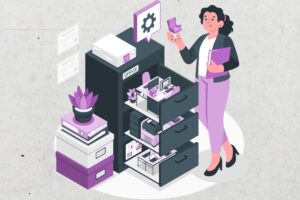
Quick Overview
Working as an office manager means keeping the office running smoothly by managing staff, resources, schedules, and operations efficiently. It requires a mix of organisational, communication, leadership, technical, and problem-solving skills.
This blog will walk you through:
✅ Core administrative skills: organisation, time management, and attention to detail
✅ Communication & interpersonal skills: verbal/written communication, empathy, and conflict resolution
✅ Leadership & team management: motivating staff, delegating, and managing teams
✅ Technical & financial skills: office software, equipment, data management, budgeting, and accounting
✅ Problem-solving & adaptability: critical thinking, decision-making, and flexibility
✅ Continuous learning: professional development, networking, and mentorship
Working as an office manager takes work as it involves keeping the office running smoothly. An office manager should possess a combination of skills such as organisation, communication, leadership and technical skills. These skills are essential to the success of a person working as an office manager. This blog will explain the essential skills that an office manager should cultivate in order to succeed in their career.
Core Administrative Skills
Organisational Skills
Good organisational skills are a must for a great office manager, as these skills allow you to run office tasks, schedules and resources. Keeping the office organised ensures the workflow runs smoothly and timelines are met on time. The level of organisation an office manager establishes in the workplace directly impacts productivity. A well-organised working space will reduce the time spent looking for documents or items, as well as prevent errors made due to disorganisation. Organisational skills are also required for juggling different activities at the same time, such as planning multiple meetings, arranging and managing employees’ schedules, and dealing with office supplies.
Organisational abilities can be trained and improved in the following ways. Begin by practising systematic approaches to common activities such as getting dressed or cooking dinner. For instance, developing a systematic approach to storing physical and digital documents with a consistent filing system can help cut down on clutter and make it easier to find what you need when you need it. Maintaining a schedule using tools such as project-management software can also help you track your tasks, deadlines and progress and prevent you from forgetting things that need to be attended to. Finally, prioritising tasks based on urgency and importance can help keep you organised. You can organise your approach by breaking down large projects into smaller tasks with deadlines for each.
It’s also important to periodically revisit and tune up your organisational tactics. When things in the office change – such as the nature of your job and the organisational requirements and structures – it’s a good idea to tweak your organisational strategies accordingly. For example, if you discover that certain processes are becoming outdated or are no longer effective, don’t be afraid to consider alternative tools or approaches that can help to improve your efficiency. Soliciting feedback from others about how your organisational systems are working can be a helpful way to identify areas that need improvement. Overall, the more adept you become at developing and refining your organisational skills, the more you will be able to help the office run more smoothly and contribute to a more collaborative, effective and enjoyable workplace.
Take Our New Managerial Skills Development Course!
Time Management
Office managers have to manage time well as they have to do many things at once and often under the pressure of time. Office managers have to do a range of work, including keeping the office running smoothly, handling staffing issues and dealing with crises. They have to set work priorities and allocate time for different tasks. Failing to manage time well can cause missing deadlines, stress and lower productivity. Hence, office managers must master time management skills.
One approach to time management is to start each day with a list of the most important activities you need to accomplish. Creating a daily or weekly to-do list can help you stay on track and ensure that you are focusing on your highest-priority tasks first. This method of time management, sometimes called the ‘Eisenhower Matrix’, involves categorising tasks based on their urgency and importance. You can then focus on urgent and important items first, then delegate, postpone or eliminate items that are less urgent and important.
Another useful tactic is time blocking – setting aside dedicated periods to work on particular activities over a day. You could, for example, block off half an hour to check emails, schedule meetings and complete any other necessary admin, or even an hour to work on a particular project. This approach will help you to limit distractions and ensure that you give the given task the amount of time it truly deserves. There are lots of digital productivity tools you can use to keep on track and record your progress throughout the day (digital calendars, task-management apps, timers, and so on).
Similarly, know when to pass on the work. As an office manager, you don’t have to do it all yourself. Passing out assignments to other team members will not only help you better manage your time. Still, it will also help empower your coworkers and foster a more collaborative work environment. By better managing your time, you can learn to more effectively juggle work, prioritise deadlines, and keep your office running smoothly.

Attention to Detail
Office managers must pay real attention to detail because their job requires them to complete tasks accurately. That means they need to catch mistakes before people get hurt or papers get lost. Likewise, office managers who keep an eye out for detail can help make sure office supplies stay supplied and are kept secure. All records and documents are prepared accurately and on time. Office managers who are detail-oriented are often faster and more reliable than others. This is because they are able to see mistakes, inconsistencies, and inefficiencies that others might miss.
One area in which attention to detail is especially important is in keeping track of office records. Office managers often deal with a wide variety of documents, such as employee personnel files, financial records, contracts, and correspondence. These records should be organised, labelled, and stored properly to facilitate the retrieval of information and comply with legal and regulatory requirements. A misfiled document or recording of the wrong information in a spreadsheet can create a headache for a manager, so it is important to develop a habit of detail orientation when working with office records.
Besides record keeping, attention to detail is equally important in organising and managing office supplies and resources. For instance, checking inventory levels frequently and tracking supply usage can prevent shortages or overstocking, both of which can pose disruptions to office work. An attentive-to-detail office manager will also make sure that office equipment is in good working order, that supplies are reordered promptly, and that the office is clean and functional.
The most important way to become more of a detail person is to systematise your approach to tasks. You can check your work, you can check your procedures, and you can use checklists. You can start to take notes when people make presentations to you or when they’re giving you instructions so that you’re getting all the details. But the more you are able to focus on the details, the more good work you’re going to produce, the better your office will run.
Communication and Interpersonal Skills
Verbal and Written Communication
Your role as an office manager requires a lot of verbal and written communication. Whether you are working with staff, clients, vendors or executives, you need to communicate clearly and professionally so that your office is running efficiently and everyone is on the same page. Being a good communicator helps you share your expectations, instructions and updates in a way that is easily understood by others. This, in turn, minimises misunderstandings and errors and helps to maintain positive relationships.
In day-to-day interactions, verbal communication may be necessary for leading meetings, giving feedback or resolving conflicts. Improving your verbal communication requires you to be concise, articulate and confident when speaking, listen attentively, and maintain an active listening stance. For example, in workplace interactions, empathising and maintaining a positive tone can help you build rapport and enhance trust with colleagues and clients.
Written communication skills are just as important, and as an office manager, you may have to draft emails, reports, memos and other documents. To improve your written communication skills:
- Make your writing clear and concise.
- Don’t use buzzwords, jargon, or complicated language that the reader will have difficulty understanding.
- Structure your messages so that they’re easy to follow, and edit for errors before you send them.
By proofreading, you can catch any typos or grammatical mistakes. This way, your writing will be professional and polished. In sum, developing your verbal and written communication skills will help you express your ideas and ensure that your messages are received and understood the way you intended.

Interpersonal Skills
It is often said that people skills are the most important in any office. If you work in an office, you will be dealing with a different range of people every day, such as employees, vendors, clients and even executives. Your ability to connect with them, figure out what they need and answer their needs will help you maintain a healthy office environment and finish tasks with ease.
Empathy is one of the most important interpersonal skills. When you can put yourself in another person’s shoes and recognise their feelings and points of view, you are able to be more responsive to their concerns, build trust, and improve your ability to find common ground. Good interpersonal skills are also essential for conflict resolution. When you use your interpersonal skills to listen to and understand the other side’s point of view, you can communicate in a way that is sensitive to their feelings and concerns and find solutions that satisfy all parties. Good listening skills are also important. When you actively listen to another person – by focusing, asking questions to clarify, and paraphrasing what you have heard – they become more likely to trust and cooperate with you.
Next, improving your interpersonal skills by developing your conflict resolution skills is important. At work, you are bound to face disagreements with peers or superiors, but handling those disagreements positively can help promote a stronger and more pleasant workplace. Having good conflict-resolution skills requires skills such as empathy, active listening, and problem-solving. Going into a conflict with an open and calm mindset will allow you to mediate the dispute, find win-win results, and negotiate common ground for all parties involved. Increased skills in these areas will not only hone your interpersonal skills. Still, they will also contribute to improved office morale and a more productive office.
Leadership and Team Management
Office managers are often responsible for leading and managing teams. Hence, developing leadership and team management skills is crucial for your progress. What does strong leadership bring to the table? It allows you to motivate and inspire your team by providing a positive work environment and making employees feel valued and supported. How about team management? This skill involves coordinating work and tasks, setting clear expectations, and monitoring progress to ensure that the team achieves its goals smoothly.
To grow as a leader, try increasing the scope of your current job by volunteering to oversee small projects, mentor junior staff, or take charge of organising office events. These kinds of experiences will help you practise making decisions, solving problems and delegating in real-time. Over time, you should also seek feedback from your colleagues and supervisors about your ability to anticipate needs, inspire others and achieve positive outcomes.
A second key skill of leaders is delegation. Delegating tasks to a team is about assigning work. However, it is also about finding the right people to do the work based on their experience and skills. Good delegation of tasks allows the work to be done well. It also builds a team’s capacity when workers take on new challenges or learn new skills. It is about setting clear expectations, providing instructions and offering support.
Leadership also involves motivating and energising your team. Celebrating victories, providing feedback and coaching, and creating opportunities for professional development can all help to build morale and support high performance. By striving to grow in your leadership and team-management skills, you can create a healthy and productive office culture that supports the success of your office and your organisation.

Technical Skills
Proficiency in Office Software
Being comfortable with office software is a basic technical skill for office managers because this software is central to how offices function and how workflows get done. The most basic office software includes Microsoft Office Suite (Word, Excel, PowerPoint), Google Workspace (Docs, Sheets, Slides), and project management tools like Trello, Asana or Microsoft Teams. You need to be able to put together documents, track schedules, analyse datasets, and communicate with your team.
If you want to master the use of office software, you could sign up for online courses or tutorials that focus on the tools that you want to learn. There are lots of online platforms available, such as LinkedIn Learning, Coursera and Udemy, that offer a range of courses from beginner’s-beginner to advanced user levels. When it comes to developing your technical skills, these courses will help. Practical experience is also important. The more you expose yourself to the features and functionalities of these tools by regularly using them to get your tasks done, the more comfortable you will be in using them.
Besides basic proficiency in it, it is important to keep up with the new features and updates released for the software on a regular basis. Most of the provider companies for office software organise webinars and have online resources and community forums for users to learn about the upgrades and latest best practices. With the updated knowledge, one can keep growing their proficiency in office software, and it helps them to work more efficiently and effectively as an office manager.
Take Our New Managerial Skills Development Course!
Knowledge of Office Equipment
Another technical skill that office managers should be familiar with is the ability to use office equipment. This term refers to the capability to operate and repair general office machines such as printers, copiers, scanners, fax machines and telecommunication systems. As an office manager, you might be in charge of the maintenance of these devices. You will need to solve any technical problems that are related to these machines, which is important for the smooth operation of the office.
Suppose you want to learn more about the IT equipment used in your office. In that case, it is useful to start by reading the user manuals and other materials that manufacturers provide online. These frequently include steps that can help to resolve any problems with equipment, including how to check and maintain it. Being more familiar with the specific models of equipment used in your office can help prepare you for the more common issues.

A third way to become more familiar with office equipment is to get your hands dirty. Although that might sound like bad advice, you can and should practise performing routine maintenance tasks such as replacing toner cartridges, clearing paper jams and setting up new equipment because many office equipment suppliers offer training sessions or online tutorials that can help you acquire these skills. You can always use the excuse that you’re simply following directions. As you become more adept at operating and maintaining office equipment, you’ll minimise downtime, depend less on outside technicians, and keep your office running smoothly.
Data Management and IT Skills
Data management and basic IT skills are also increasingly important for office managers as more of the tools used by businesses and the ways in which data is used to inform decision-making are digital. Office managers will often manage and store sensitive data – e.g., employee records, financial data, and business documents – and may be involved in troubleshooting basic IT issues, working with IT staff, or ensuring that office technology is used effectively.
Suppose you want to strengthen your data management skills and learn how to structure, store and secure digital files. This involves understanding file management systems, creating cloud storage solutions, and applying data security such as encryption and password protection. Familiarity with data management software, such as Microsoft Excel or Google Sheets, also helps with structuring and analysing data. Take courses or attend workshops on data management to hone your skills.
Basic IT skills are also useful for office managers – particularly for troubleshooting common technical problems and supporting the office’s technology. Understanding the basics of networking – such as how we connect to the wider internet – and how you can manage your own and others’ user accounts and resolve common connectivity problems are valuable. You can improve your skills in these areas by, for example, taking online courses, working with your company’s IT team, or attending IT training sessions. If you improve your data-management skills and your IT skills, you can help make your office more secure and efficient, and you’ll be well-equipped to deal with the technical problems that arise in your day-to-day work.
Financial and Budgeting Skills
Budget Management
Budget management is one of the main responsibilities of office administrators since they are usually in charge of all the financial aspects of their organisation’s offices: expenses, resource allocation and future needs.
Good budget management allows offices to work properly without overspending and without wasting resources, which can be used to achieve a company’s goals. Office managers must be able to keep track of expenses, predict the company’s financial needs and make adjustments to the budget if there are any changes in priorities or unforeseen expenses.

To learn how to budget, first, get to know the baseline budget and financial reports for your office; understand where the money is being spent and how the resources are being allocated. Knowing your starting point will help you manage your budget more effectively in the coming years. Next, learn how to track the expenses. That is, keep detailed records of every purchase, categorise the expenses, and review them on a regular basis to identify saving areas. A spreadsheet or budgeting software might be helpful in tracking information and running analyses.
Preparing financial reports is a big part of budget management. These reports – usually presented at the end of a fiscal period – summarise the office’s financial transactions, such as income, expenses and variance from the budget, if any. If you need to improve your skills, consider enrolling in a financial reporting course or using a reporting template that walks you through the process of pulling and presenting financial data clearly and accurately. To improve your skills in budget management, enrol in a finance course for managers or sign up for a Google finance course with Udemy.
Basic Accounting Knowledge
If you are an Office Manager and you are in charge of the office finances, you have to know how to keep the accounts, raise invoices and process payments. If you have accounting knowledge, you will be able to maintain an office financial record, comply with financial regulations and make decisions about when and how to spend office resources. An office manager with accounting skills will be able to handle the office financial work on a day-to-day basis, which includes reconciling accounts, preparing the accounts for management, and organising the payment of bills and staff salaries.
If you want to improve your accounting skills, take a basic accounting class. Community colleges, online providers, and professional organisations offer classes for non-accountants on subjects such as the double-entry bookkeeping system, preparation of financial statements, payroll processing and other topics. The classes will provide you with a general knowledge of accounting principles and practices, enabling you to understand better and control the financial transactions over which you have responsibility and to ensure that your office is run on a sound financial basis.
Formal education in bookkeeping and accounting will enhance your financial skills, but learning to use some accounting software (such as QuickBooks, Xero or Sage) can also help you in your day-to-day management of office money. By using the programme to generate invoices, track expenses, or produce reports on the office’s financial status, you can more easily keep track of the books and be aware of their true financial state. You can often find online tutorials that will help you learn the steps to use these programmes. Once you’re familiar with the programmes, it will be easier for you to take on the financial jobs of the workplace. Introduce yourself to basic accounting so you’ll be more capable of managing the financial aspects of your job and helping your organisation succeed.
Problem-solving and Decision-Making Skills
Critical Thinking
Critical thinking is an important quality of an office manager, which can be described in the following way:
Critical thinking is an important skill for any office manager, as it involves the ability to analyse a situation, identify problems and solve issues. An office has to be a dynamic environment, which means that different challenges and problems can arise at any moment, so a well-rehearsed reply must come from the office manager, which should be well-reasoned and considered. A good office manager will be able to consider different options and assess the likely outcomes of each, making a choice based on what is best for the organisation.

Another avenue for cultivating stronger reflective choices is reflective learning. When you encounter a problem, please take a few minutes to reflect on the approach you took to solving it and on the product of your efforts: what worked, what didn’t, and what could have been done differently. Reflective practice hones your ability to learn from your experiences. As you reflect on your past choices, you will become better able to choose how to solve problems over time. Finally, there are activities that you can do today to increase your ability to think in ways that can be developed for future problems. You can improve your capacity for a particular mode of reflective thinking by practising related challenges, such as puzzles, board games or case studies that involve strategic thinking, moral reasoning or analogical reasoning – the ability to think across categories.
Another is to ask others for feedback. Consult your coworkers or your mentors when you’re trying to work through a complicated decision because they might have good ideas or perspectives that you haven’t thought about. You might also create an environment that encourages conversations in which you could analyse and debate potential solutions, further developing your reasoning skills and becoming more confident in what you know and are able to do. As you develop your critical thinking skills, you will be better able to cope with the challenges of your role and to make sound decisions when they’re called for, helping your office and your organisation.
Adaptability and Flexibility
Being flexible and adaptable is important for an office manager, who has to be able to react to unexpected challenges, changing priorities or shifting office dynamics. The ability to react quickly to new situations and remain flexible in how you approach them can help keep your office productive and your morale high. Adaptable office managers can shift strategy as needed, embrace new technologies or processes, and manage teams through periods of change.
Being open to change is one way to become more flexible. Instead of reacting to change with resistance or frustration, treat it as a chance to improve and enhance what you do. Be open to new ideas and approaches, and be willing to experiment with different methods until you find one that works. Practising mindfulness can help you stay calm under pressure. When you find yourself facing an unexpected situation, you’ll be more likely to keep a clear and focused mind. This can help you to react more objectively to the situation.

Part of this involves being open to learning new skills. As an office manager, you might have to take on new responsibilities or find yourself learning to use tools or technologies that are new to you. Staying curious and proactive about your professional development will make you more adaptable. However, you can also cultivate a flexible mindset within your team that makes the office a more resilient place to work, where everyone is prepared to deal with change productively. When you cultivate adaptability and flexibility, you will be better prepared to face the uncertainty of your role and to lead your team through any challenges.
Conflict Resolution
Office managers must have good conflict management skills. Resolving conflicts between people is important because it keeps the office environment pleasant and makes people capable of working together.
When people work in a team, they have different personalities and come from different backgrounds. As a result, sometimes people misunderstand, dislike each other or have conflicting interests. It is the job of an effective office manager to intervene in disputes and provide a channel for expressing opinions and solving problems. This helps to maintain the office as a pleasant and pleasant place to work and prevents minor conflicts from escalating into something bigger.
First, there is a negotiation technique to deal with conflicts – mediation skills. As a mediator, you take a neutral position and hear all parties involved. Your task is to help them articulate what’s bothering them and how they see the situation. By keeping them talking and listening to their concerns, you can clarify what their real conflict is and help the parties arrive at a solution that satisfies everyone’s needs. The key to effective mediation is patience and a neutral stance – you shouldn’t take either side, and you shouldn’t try to rush into a solution. This keeps the process feeling fair and builds trust.
Negotiation abilities are another crucial skill for resolving conflicts. In the event that compromise is required, an office manager needs to be able to moderate discussions where both parties can give and take for the sake of reaching an agreement. The individual might propose alternative solutions, identify shared interests or common ground, or clarify boundaries and expectations. Effective negotiation techniques, such as active listening, clear communication and creative problem-solving, will help you learn how to resolve conflicts.
Along with these techniques, creating a culture of respect and collaboration within the office will help prevent conflicts from arising in the first place. Open communication, teamwork and quick resolutions to conflict will help foster an office where employees feel valued and heard. Developing your conflict resolution skills will create an environment where disputes are rare, easily mitigated and constructive if they do arise.
Continuous Learning and Professional Development
Lifelong Learning
Lifelong learning is becoming essential for office managers to remain relevant and productive in their roles. The business environment is fast-changing, with new technologies, trends and best practices becoming available frequently. As an office manager, you will need to commit to a lifelong learning program in order to keep up with these changes. This will help you develop yourself and grow your skills and knowledge, as well as demonstrate your commitment to your growth and your adaptability to the changing needs of your organisation.
Another form of lifelong learning is being involved in seminars, workshops and conferences that deal with office management, leadership or your particular industry. Seminars, workshops and conferences are a great way to learn from the experts, increase your knowledge and keep up with the latest in your field. Often, professional societies provide training and certification programmes that will help you acquire specific skills and enhance your credentials.
Online courses and webinars are other ways to keep learning. LinkedIn Learning, Coursera, and edX are among the many online platforms that offer courses in subjects such as project management, communications and technology. These courses are typically flexible and self-directed, letting you keep up with your learning while juggling your day job. Staying in the game means committing to regular learning.

Networking and Mentorship
Another way you can refine your office management skills is through networking in your professional circle and finding a mentor who can guide you. Making new professional contacts and building a professional network will help you become closer to other office managers, vendors, or other people who work in your field; you can connect with these people to discuss matters that are important to you and get advice, counsel or learn from their mistakes. You can also network to get new job opportunities or find new vendors for your office, or even new people to hire or partner with. These new contacts can help you get better at your job or help you learn new things.
To create a network of professional contacts, begin by attending professional conferences, joining professional associations and participating in online forums or social media groups related to office management. Engage with others, share your ideas and experiences, and offer support where you can. If there’s someone else whose work you admire, reach out to them to build a relationship that leads to mentorship.
Finally, mentorship is one of the most important aspects of a professional path because it’s a personalised learning experience with someone who has walked the road you’re travelling. A mentor can help you overcome obstacles, craft your career goals, and develop the skills you need to move up to the next level. Think about the people you already know and identify someone who could serve as a mentor or find successful people who excel in areas where you want to grow. When you approach a potential mentor, please explain what you’d like to get out of the relationship and be open to their advice.
Take Our New Managerial Skills Development Course!
Conclusion
To be successful as an office manager, one needs to acquire a variety of skills, including administrative proficiency, excellent communication skills, technical competence, financial acumen, and problem-solving skills. The ability to constantly and consistently improve upon these skills will ensure that you maintain a competitive advantage in this role. To that end, it would be a good idea to pursue opportunities for continuous learning and skill development. It’s a role that is very rewarding and comes with great responsibility.
